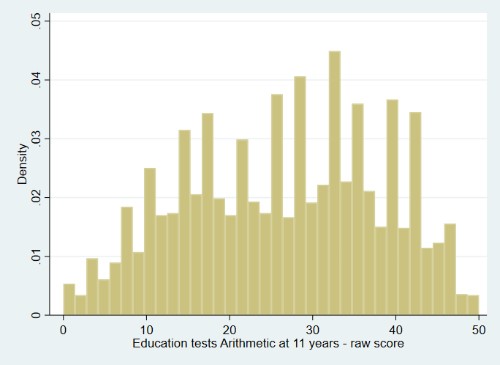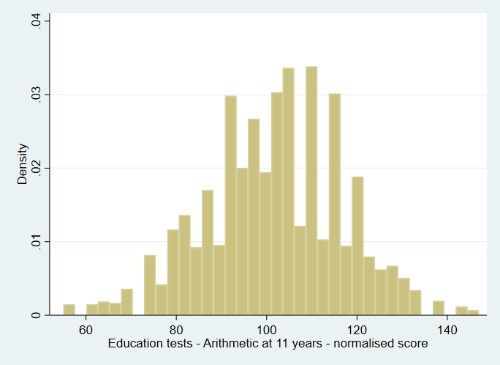The MRC National Survey of Health of Development (NSHD) assessed their cohort members (CMs) during the study’s age 11 sweep using the Arithmetic Test.
Details on this measure and the data collected from the CMs are outlined in the table below.
| Year of data collection: | 1957 | |
| Domain: | Verbal (problem questions) | |
| Non-verbal (mechanical sums) | ||
| Measures: | Mathematical ability/knowledge | |
| Mathematical achievement | ||
| CHC: | Gq (Quantitative Knowledge) | |
| CLOSER Source: | Explore this sweep in CLOSER Discovery: NSHD 1957 (Age 11) (opens in a new tab) | |
| Administration method: | Teacher/psychologist/trained individual; face to face; pen and paper | |
| Procedure: | This test consisted of 50 questions (20 mechanical sums, 30 problem questions). Questions assessed ability to add, subtract, multiply and divide. The overall testing session at age 11 lasted under 2 hours. | |
| Link to questionnaire: | https://skylark.ucl.ac.uk/NSHD/lib/exe/fetch.php?media=questionnaires:1957_sm_nf3.pdf (opens in new tab) | |
| Scoring: | One mark for each solved problem (0 - 50) | |
| Item-level variable(s): | Not currently available | |
| Total score/derived variable(s): | A11R, A11R57, A1157, A11N | |
| Descriptives: | Raw score | Normalised score |
| N = 4,025 | N = 4,025 | |
| Range = 0 - 50 | Range = 55 - 147 | |
| Mean = 26.39 | Mean = 101.84 | |
| SD = 11.74 | SD = 15.13 | |
(click image to enlarge) | (click image to enlarge) |
|
| Age of participants (months): | Mean = 130.33, SD = 1.06, Range = 128 - 137 | |
| Other sweep and/or cohort: | None | |
| Source: | Pigeon DA. Tests used in the 1954 and 1957 surveys. In: Douglas JWB, ed. The home and the school. London: MacGibbon and Kee, 1964. (Appendix 1.) | |
| Technical resources: | None | |
| Example articles: | Richards, M., Hardy, R., Kuh, D., & Wadsworth, M. E. (2001). Birth weight and cognitive function in the British 1946 birth cohort: longitudinal population based study. BMJ, 322(7280), 199-203. | |
| Kuh, D., Richards, M., Hardy, R., Butterworth, S., & Wadsworth, M. E. (2004). Childhood cognitive ability and deaths up until middle age: a post-war birth cohort study. International Journal of Epidemiology, 33(2), 408-413. | ||
Go to:
- Overview of all cognitive measures in NSHD
- Overview of childhood cognitive measures across all studies
This page is part of CLOSER’s ‘A guide to the cognitive measures in five British birth cohort studies’.
